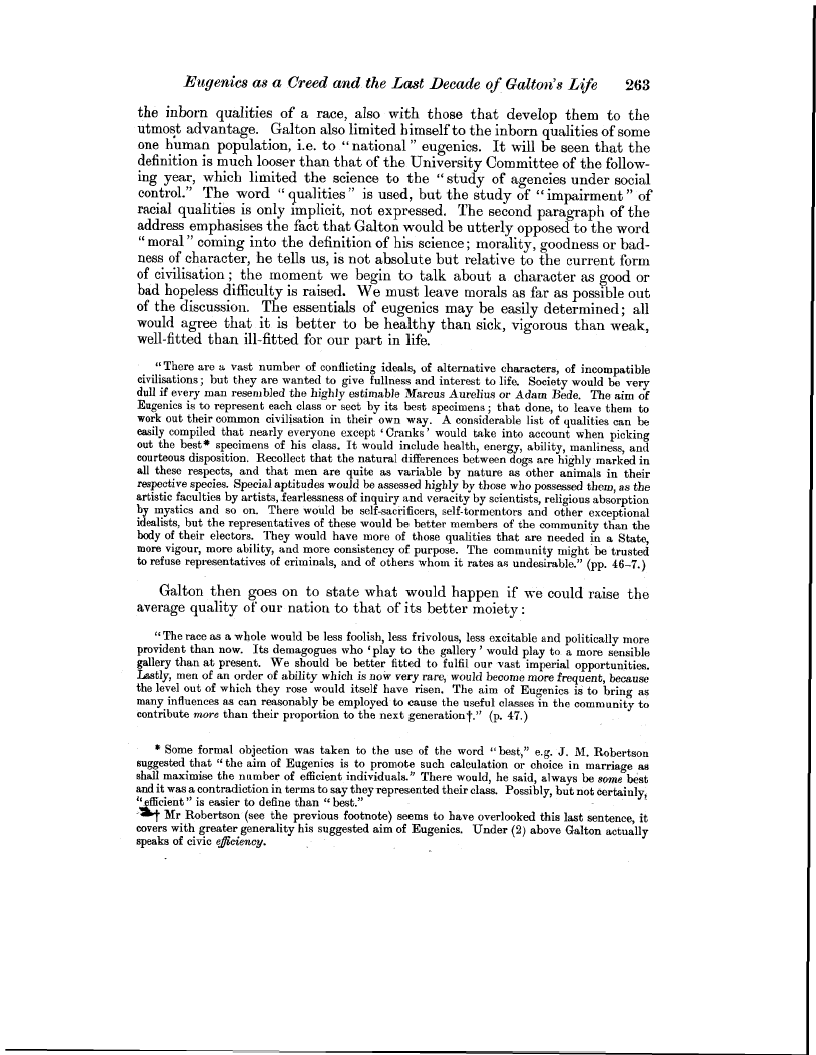| ||||||

OCR Rendition - approximate
Eugenics as a Creed and the Last Decade of Galton's Life 263 the inborn qualities of a race, also with those that develop them to the utmost advantage. Galton also limited himself to the inborn qualities of some one human population, i.e. to " national " eugenics. It will be seen that the definition is much looser than that of the University Committee of the following year, which limited the science to the " study of agencies under social control." The word " qualities " is used, but the study of " impairment " of racial qualities is only implicit, not expressed. The second paragraph of the address emphasises the fact that Galton would be utterly opposed to the word " moral " coming into the definition of his science ; morality, goodness or badness of character, he tells us, is not absolute but relative to the current form of civilisation ; the moment we begin to talk about a character as good or bad hopeless difficulty is raised. We must leave morals as far as possible out of the discussion. The essentials of eugenics may be easily determined; all would agree that it is better to be healthy than sick, vigorous than weak, well-fitted than ill-fitted for our part in life. "There are a vast number of conflicting ideals, of alternative characters, of incompatible civilisations; but they are wanted to give fullness and interest to life. Society would be very dull if every man resembled the highly estimable Marcus Aurelius or Adam Bede. The aim of Eugenics is to represent each class or sect by its best specimens; that done, to leave them to work out their common civilisation in their own way. A considerable list of qualities can be easily compiled that nearly everyone except ' Cranks' would take into account when picking out the best* specimens of his class. It would include health, energy, ability, manliness, and courteous disposition. Recollect that the natural differences between dogs are highly marked in all these respects, and that men are quite as variable by nature as other animals in their respective species. Special aptitudes would he assessed highly by those who possessed them, as the artistic faculties by artists,f fearlessness of inquiry and veracity by scientists, religious absorption by mystics and so on. There would be self-sacrificers, self-tormentors and other exceptional idealists, but the representatives of these would be better members of the community than the body of their electors. They would have more of those qualities that are needed in a State, more vigour, more ability, and more consistency of purpose. The community might be trusted to refuse representatives of criminals, and of others whom it rates as undesirable." (pp. 46-7.) Galton then goes on to state what would happen if we could raise the average quality of our nation to that of its better moiety "The race as a whole would be less foolish, less frivolous, less excitable and politically more provident than now. Its demagogues who `play to the gallery' would play to a more sensible gallery than at present. We should be better fitted to fulfil our vast imperial opportunities. Lastly, men of an order of ability which is now very rare, would become more frequent, because the level out of which they rose would itself have risen. The aim of Eugenics is to bring as many influences as can reasonably be employed to cause the useful classes in the community to contribute more than their proportion to the next generation'." (p. 47.) * Some formal objection was taken to the use of the word "best," e.g. J. 1. Robertson suggested that "the aim of Eugenics is to promote such calculation or choice in marriage as shall maximise the number of efficient individuals." There would, he said, always be some best and it was a contradiction in terms to say they represented their class. Possibly, but not certainly, `` efficient" is easier to define than " best." - Mr Robertson' (see the previous footnote) seems to have overlooked this last sentence, it covers with greater generality his suggested aim of Eugenics. Under (2) above Galton actually speaks of civic efficiency.
|